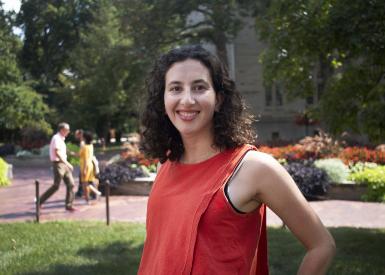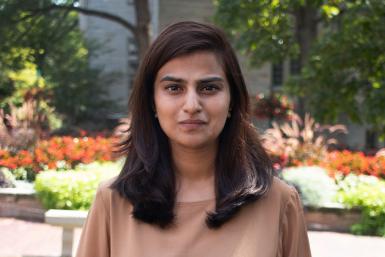Grad students present research on media, difference and inequality
Graduate students Violet Baron, Ryan Comfort and Narmeen Ijaz gave virtual lectures Friday on their research related to media, difference and inequality.
The talk was part of a three-part series during the Media Arts and Sciences Colloquium, a weekly opportunity for graduate students and faculty to present their research, as well as hear from guest speakers.
Growing in Place: Person-centered reporting in rural communities

Baron, a master’s student, presented her podcast, “Growing in Place.” Produced this summer with guidance and support from professor of practice Elaine Monaghan, it focuses on resilience in the stories of five people and their communities as they weather the COVID-19 pandemic.
The episodes feature a local farmer who experienced a rapid increase in demand when the pandemic began, a 4-H instructor working with farm kids as the state fair went virtual, a Kroger employee who felt his employers failed to protect him from the virus, a school superintendent who ensured that school food was distributed to students and families who qualified for free and reduced lunch, and a young farmer whose challenges were magnified by a sudden change to the way of life.
“My main goal was to listen and let the interviewees lead,” Baron said. “I came in with questions but let them have ownership of the narrative.”
Baron, who studies in both The Media School and the Department of Folklore and Ethnomusicology, said her work is a hybrid of ethnography and reporting. She tried to center her interviewees as experts, and got complex answers she didn’t always expect.
“Growing in Place” is published by the Indiana Environmental Reporter. The podcast was supported with a grant from IU’s Center for Rural Engagement.
Systemic racism and the role of marginalized voices in media research and production

Comfort’s presentation took an enlightening and critical look at the conception of media production and research and how failings there can recycle the same stereotypes.
The doctoral candidate offered a one-two punch of his findings and an action item: because his research illustrated that perceptions of a population can influence media production and research on that population, he said it’s essential to seek advice before conceptualizing a project — rather than feedback after.
Comfort said he’s often asked to consult at the end of that conception stage, when a producer or researcher is trying to sell an idea to a community that’s resistant. Instead of asking how to overhaul that idea and construct a better one, he’s asked to help lessen the blow.
In his research, Comfort looked specifically to media narratives surrounding portrayals of Indigenous communities. In that work, prior knowledge always informs contemporary coverage, he said. Longstanding stereotypes — native communities as “monolithic plains culture” and “aggressive warriors,” “spiritual and earthly sages” — resurface again and again because they’re so heavily emphasized in media and education.
The same was often true of research work, Comfort said.
The way to break that cycle, he said, is to seek advice from communities on what communication or research is essential and welcomed, and not to turn to them for advice after the fact. It’s hard to let go of a fully baked idea, but easy to get advice in creating one.
Truth in transnational documentary: Representation of South Asian realities

To think critically about documentaries on South Asian countries and the narratives espoused by them, Ijaz, a master’s student, began by looking to the history of documentary in South Asia.
The earliest emergence of it was during British colonial rule, when geographical films were produced to document the land. But that mode of filmmaking often represented imperialist ideals. Films like “A Native Street in India,” “Darjeeling” and “In Rural Maharashtra” operated as a means of justifying imperialism by emphasizing portraits of India as impoverished and struggling.
“Global ideologies and aims and goals are getting to dictate local level narratives,” Ijaz said.
To analyze the state of contemporary documentaries of South Asian countries, Ijaz looked to the reflection of Pakistan and other countries in post-9/11 documentary filmmaking. Often, such films focused on religious fundamentalism, oppression of women and terrorism.
To decolonize documentary in South Asia, there is a need for a more robust funding and production ecosystem for documentary making, Ijaz said. The main goal is to find diversity of local voices within the region itself, and therefore tackle elitism, classism and casteism.

